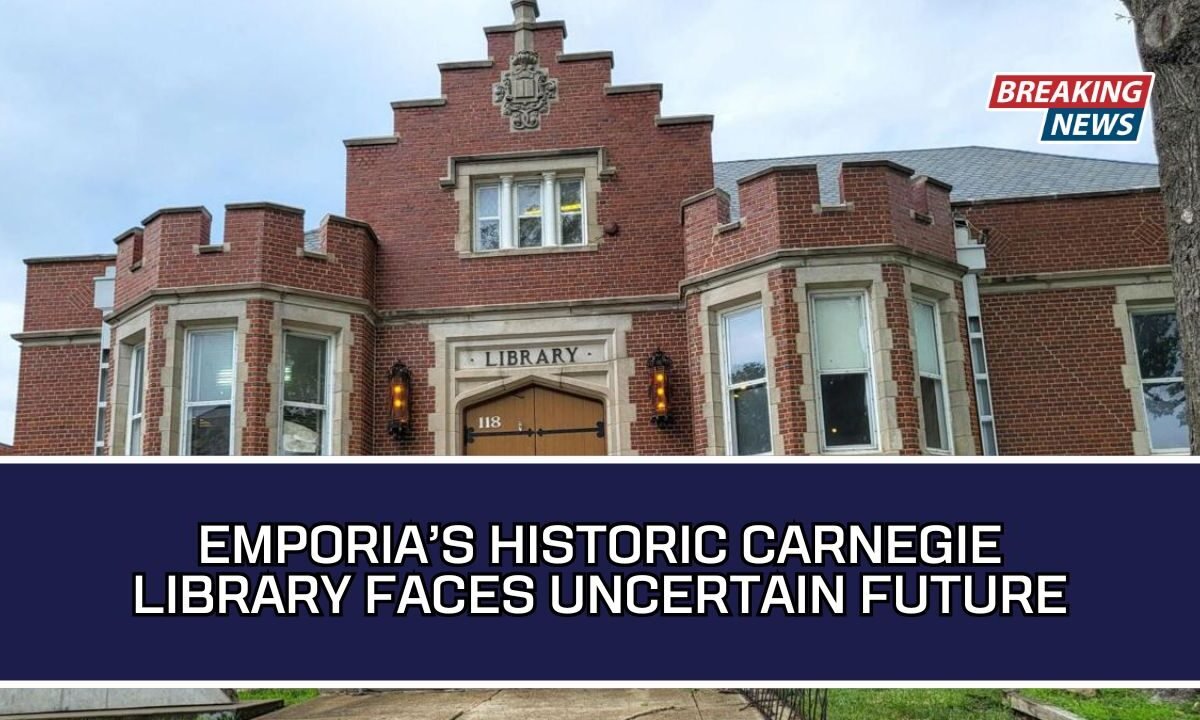The historic Carnegie Library in Emporia, Kansas, has stood tall for more than a century, but now it faces an uncertain future. On Wednesday evening, around 30 local residents gathered at the Little Theater to discuss what should happen next to this iconic landmark.
The meeting focused on the library’s current condition, its history, and what could be done to restore or repurpose it before it’s too late.
Built in 1906, the Emporia Carnegie Library is one of many libraries funded by philanthropist Andrew Carnegie in the early 1900s. Over the decades, it served several roles — first as Emporia’s main public library and later as the home of the Lyon County History Center (LCHC).
When the history center moved to Commercial Street, the building was used for storage until it was completely vacated in 2020. Since then, the structure has sat empty, waiting for a new purpose.
Uncertain Future Ahead
The City of Emporia has announced that it is accepting proposals for restoration or preservation projects until December 31.
If no serious bids are received, the city may consider several options — including mothballing the building, using it for another city purpose, or, in the worst case, demolishing it.
City Manager Trey Cocking said the city will review all proposals carefully but also emphasized that any potential buyer must have enough funds to maintain the building.
Here’s a quick look at the key details about the Carnegie Library:
| Key Details | Information |
|---|---|
| Year Built | 1906 |
| Former Uses | Public Library, Lyon County History Center |
| Vacant Since | 2020 |
| Proposal Deadline | December 31, 2025 |
| Possible Outcomes | Restoration, City Use, or Demolition |
Voices From the Forum
At the public meeting, several speakers shared their insights. Trey Cocking discussed what options the city has and how they would move forward. Clint Hibbs from BG Consultants talked about the library’s current condition, saying it shows wear and tear expected in an unused structure.
Lori Cook DeWinkler, site manager at Red Rocks, highlighted the tourism value of preserving historic buildings. Casey Woods, Executive Director of Emporia Main Street, shared details about available grants and funding for anyone interested in taking on the restoration project.
Katrina Ringer from the Kansas State Historical Society explained how the state supports such restoration efforts through grants and tax credits. She also noted that any restoration work must follow state and federal preservation standards.
The Community’s Role
The event was organized by community member Don Loux, who also led a guided tour of the library earlier in the day. Loux said his goal was to help people understand the building’s current condition and see what might be possible.
“As long as it’s standing, it’s an asset to the city,” Loux said. He suggested that the building could even be sold to a private owner who could pay taxes and keep it in good condition.
Cocking admitted that so far, no strong proposals have been submitted. He emphasized that owning such a building requires significant resources and a solid plan for upkeep. “This is not going to be a cheap building to own,” he said. “You’ll need tenants or some way to cover maintenance costs.”
Restoration or Demolition?
Although demolition has been mentioned, it remains the last resort. According to city officials, this would only happen if all other options fail. State Historic Preservation Officer Patrick Zollner could even challenge such a decision in court to protect the building.
Ringer, who recently toured the library, said that while the building has issues like leaks and cracks, these problems are typical for unused historic structures and can be repaired. “It’s nothing that can’t be reversed or rehabilitated,” she said.
Hope for the Future
As the December 31 deadline approaches, the city hopes someone with both passion and funding will step forward to save this piece of Emporia’s history. The Carnegie Library stands as a reminder of the city’s cultural roots and community pride.
Whether it is restored, repurposed, or lost, its future will depend on the people of Emporia and their willingness to preserve this piece of history for generations to come.




